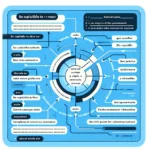The phrase “be at odds with + noun” is a useful idiomatic expression that can enhance your IELTS performance by demonstrating a more sophisticated command of English. This structure frequently appears in IELTS reading passages and can be effectively employed in writing and speaking tasks to express disagreement or conflict. Let’s delve into its meaning, usage, and application in IELTS.
Understanding “Be at Odds With + Noun”
The expression “be at odds with + noun” means to be in conflict or disagreement with someone or something. It’s used to describe a situation where there’s a discrepancy or contradiction between two things, ideas, or people.
Grammatical Structure
The basic structure is:
Subject + be (conjugated) + at odds with + noun
Examples:
- The employee is at odds with his manager over the new policy.
- Their beliefs are at odds with modern scientific evidence.
- The company’s actions were at odds with their stated values.
 Be at odds with concept
Be at odds with concept
Using “Be at Odds With + Noun” in IELTS Tasks
IELTS Writing Task 2
In Writing Task 2, this phrase can be particularly effective when discussing conflicting ideas, policies, or social issues.
Example:
“In many countries, economic growth is at odds with environmental protection. While governments aim to boost their economies, these efforts often are at odds with the need to preserve natural resources.”
Analysis: This usage demonstrates a sophisticated understanding of the conflict between economic development and environmental conservation, which is a common IELTS topic.
IELTS Speaking Part 3
For the Speaking test, you can use this phrase to express your opinion on complex issues.
Example:
Examiner: “Do you think traditional values are still important in modern society?”
Candidate: “While I believe some traditional values remain crucial, others are at odds with modern concepts of equality and individual freedom. For instance, traditional gender roles are often at odds with current ideas about gender equality in the workplace.”
Analysis: This response shows the ability to discuss nuanced topics using advanced vocabulary, which can contribute to a higher band score.
Common Collocations and Variations
To further enhance your use of this phrase, consider these common collocations:
-
Be completely at odds with
Example: “The new legislation is completely at odds with the principles of free speech.” -
Be fundamentally at odds with
Example: “Their approach to education is fundamentally at odds with modern pedagogical theories.” -
Seem to be at odds with
Example: “The company’s environmental claims seem to be at odds with their actual practices.” -
Find oneself at odds with
Example: “Researchers often find themselves at odds with government policies on climate change.” -
Remain at odds with
Example: “Despite negotiations, the two countries remain at odds with each other over border disputes.”
Achieving Higher Band Scores with “Be at Odds With + Noun”
To score higher in IELTS, it’s crucial to use this phrase accurately and in appropriate contexts. Here’s how you can elevate your language use:
Band 6-7:
Basic use of the phrase in simple contexts.
Example: “The two political parties are at odds with each other on many issues.”
Band 7-8:
More nuanced use with additional modifiers or in complex sentences.
Example: “Environmental activists often find themselves at odds with industrial lobbyists, particularly when it comes to legislation on carbon emissions.”
Band 8-9:
Sophisticated use in complex ideas, possibly combined with other advanced structures.
Example: “The rapid pace of technological advancement is increasingly at odds with traditional notions of privacy, compelling legislators to grapple with the challenge of balancing innovation and individual rights in the digital age.”
Common Mistakes to Avoid
-
Incorrect preposition: “be at odds of” instead of “be at odds with”
Incorrect: “His actions are at odds of his words.”
Correct: “His actions are at odds with his words.” -
Using singular verb with plural subject:
Incorrect: “The findings is at odds with previous research.”
Correct: “The findings are at odds with previous research.” -
Overuse or inappropriate context:
Avoid using this phrase for simple disagreements. It’s more suitable for significant conflicts or contradictions. -
Mixing tenses:
Incorrect: “The new policy is at odds with what they were promising last year.”
Correct: “The new policy is at odds with what they promised last year.” -
Using with non-conflicting concepts:
Incorrect: “His love for music is at odds with his passion for painting.”
(This doesn’t make sense unless there’s a specific conflict between these interests)
Conclusion
Mastering the use of “be at odds with + noun” can significantly enhance your IELTS performance. It allows you to express complex ideas about conflict and disagreement in a sophisticated manner. Practice using this phrase in various contexts related to common IELTS topics such as environment, technology, education, and social issues. Remember to use it judiciously and accurately to maximize its impact on your scores.
For further practice, consider applying this phrase to topics like economic policies and income distribution or managing environmental impact of urban growth. These areas often involve conflicting interests and are perfect for employing this structure in your IELTS responses.


